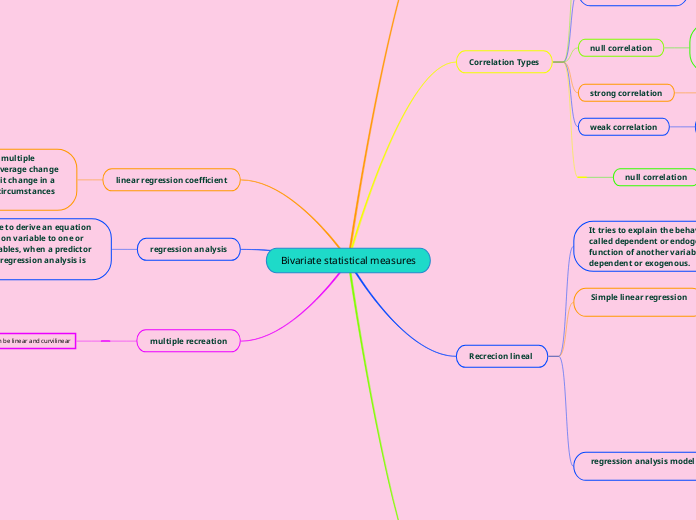Bivariate statistical measures
Linear correlation
Stable is the relationship or dependence that exists between two variables that intervene in a two-dimensional distribution, that is, it determines it and if so we will say that the variables are correlated or that there is a correlation between them.
Correlation Types
direct correlation
It occurs when increasing one of the variables increases the other.
inverse correlation
It occurs when increasing one of the variables decreases the other. The line corresponding to the cloud of points of the distribution is a decreasing line.
null correlation
Null correlation occurs when the two assets have no dependence or relationship with each other.
strong correlation
It will be stronger the closer it is to the points on the line.
weak correlation
It will be weaker the farther apart the points are on the line.
null correlation
There is no correlation
Positive correlation
high positive correlation
Recrecion lineal
It tries to explain the behavior of a variable called dependent or endogenous as a function of another variable called dependent or exogenous.
Simple linear regression
Linear function that satisfies the properties active property that is a polynomial function whose representation is in the Cartesian plane is a straight line
regression analysis model
Deterministic: deterministic: assumes that under ideal conditions the behavior of the dependent variable can be fully described by a mathematical function of the independent variables, that is, under ideal conditions the model allows the value of the dependent variable to be predicted without error.
statistical: allows the incorporation of a Random Component in the relationship, consequently, the predictions obtained through statistical models will have an associated prediction error
Standardized: the slope &1 indicates the relationship between the two variables, its sign indicates the positive or negative relationship, the reason is that its numerical value depends on the units of measurement of the two variables, a change of units is one of them can produce a drastic change in the value of the slope
Determination coefficient R2
The determination coefficient, also called R square, determines the degree of correlation between the variables, which reflects the goodness of a model fit for the variable.
linear regression coefficient
quantity that results from a multiple analysis that indicates the average change in a criterion variable per unit change in a predictive variable in equal circumstances in all as a criction variable
regression analysis
statistical technique to derive an equation that relates a criterion variable to one or more predictor variables, when a predictor variable is used the regression analysis is multiple
multiple recreation
Recreation can be linear and curvilinear
Recreation can be linear and curvilinear
regression coefficient
he egrection coefficient can be: the number of units in which the variable y is modified by the effect of the independent change x or vice versa in a unit of measurement.
positive
Negative
Null
